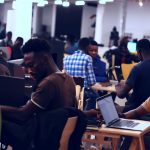In Tanzania’s Zanzibar archipelago, rural agriculturists are employing an AI-powered application named Nuru, which operates in the local Swahili language, to identify a catastrophic disease affecting cassava crops early on to prevent its spread. Meanwhile, in South Africa, computer science experts have developed machine learning algorithms to study the effects of racial segregation on residential patterns. Furthermore, in Nairobi, Kenya, AI technology is being utilized to sort through images captured by thousands of surveillance cameras installed around the vibrant city center’s lampposts.
The potential impact of embracing AI on the economies of Africa is striking. Predictions indicate that if businesses in just four countries—Nigeria, Ghana, Kenya, and South Africa—start leveraging AI tools more extensively, they could collectively achieve economic gains amounting to as much as $136 billion by the year 2030.
In response to this, the African Union, which comprises 55 member states, is drafting an ambitious policy on AI. This policy aims to carve out a unique pathway for both the development and oversight of this burgeoning technology across the continent. However, this initiative faces potential hurdles. The timing of AI regulation is a topic of heated debate, with concerns that overly stringent rules might hamper innovation. Additionally, the continent’s existing AI infrastructure, or lack thereof, could delay the widespread adoption of AI technologies.
Chinasa T. Okolo, a Brookings Center for Technology Innovation fellow who specializes in AI governance and policy development within Africa, emphasizes the significance of establishing clear regulations for AI. “As AI continues to expand across the continent, there must be established guidelines to manage these technologies,” she states.
Several African nations are taking proactive steps towards creating their own legal and regulatory frameworks for Artificial Intelligence (AI). To date, seven countries have rolled out national AI policies and strategies, each at varying phases of execution.
On February 29, the African Union Development Agency issued a draft policy that serves as a foundational guide for AI regulations across the continent. This draft outlines proposals for sector-specific guidelines and practices, the creation of standards and certification bodies to evaluate and rate AI systems, the introduction of regulatory sandboxes for the secure experimentation of AI technologies, and the formation of national AI councils tasked with supervising and ensuring the ethical use of AI.
Elsewhere, significant developments in AI legislation and policy are unfolding. This week marked the passage of the AI Act by the European Union, positioning it as the first extensive law on AI globally. In the United States, an executive order regarding AI was issued in October. Meanwhile, the Chinese government is considering a comprehensive AI law akin to that of the EU, in addition to enacting regulations targeting specific AI technologies as they emerge.
Experts express concern that without the establishment of their own regulatory frameworks aimed at safeguarding citizens from potential abuses of technology, African nations might encounter social detriments, including discriminatory practices that could deepen inequalities. Furthermore, there is apprehension that these economies might fall behind if they fail to leverage the advantages of AI.
Several African researchers believe that it’s premature to discuss AI regulation at this point. The AI sector in Africa is still in its early stages, hindered by the significant expenses associated with establishing data infrastructure, limited access to the internet, insufficient funding, and a shortage of advanced computers required for training AI models. Additionally, there is a challenge in obtaining quality training data. Much of the data relevant to Africa is controlled by companies based outside the continent.
In the month preceding the African Union’s (AU) release of a draft policy on AI, Shikoh Gitau, a computer scientist who founded the AI research lab Qubit Hub in Nairobi, presented a paper. This paper argued for the importance of first fostering an AI industry in Africa before imposing regulations on the technology.
David Lemayian, a software engineer and co-author of the paper, remarked, “By choosing to regulate first, we miss out on identifying the innovations and opportunities that are available for Africa.”
Okolo, who offered advice on the draft AU-AI policy, holds the view that Africa should take a forward-looking stance in the creation of regulations. She believes that to tackle the challenges posed by AI, African nations should update existing legislation, including those concerning data privacy and digital management.
On the other hand, Gitau expresses worry that rushing into AI regulation might slow down its uptake. She emphasizes the importance of developing indigenous AI solutions that are specifically designed for the African context, arguing that this is essential for leveraging AI’s potential to boost economic development.
“Before we implement regulations, it’s crucial to fully grasp the technology’s vast scope and commit to developing Africa’s AI ecosystem,” she emphasizes.
According to the Organisation for Economic Co-operation and Development’s AI Policy Observatory, over 50 nations and the European Union have established AI strategies, with more than 700 AI policy actions initiated since 2017. However, only a mere five of these initiatives originate from Africa, and none of the OECD’s 38 member nations are African.
The global conversation on AI governance and regulation has significantly overlooked Africa’s insights and viewpoints, states Melody Musoni, a specialist in policy and digital governance at the European Centre for Development Policy Management (ECDPM), a think tank focused on independent policy in Brussels.
Musoni asserts, “It’s essential for us to share our viewpoints and take charge of our regulatory frameworks. Our goal is to be creators of standards, not merely adopters.”
Nyalleng Moorosi, an expert in machine learning ethics and fairness based in Hlotse, Lesotho, and affiliated with the Distributed AI Research Institute, highlights the issue of labor exploitation within some African nations by AI firms. She points out the substandard wages and the absence of mental health support for data annotators, who often come from impoverished countries but serve major tech corporations. Moorosi advocates for regulatory measures to curb such exploitation and to safeguard communities from the potential abuses by large enterprises and autocratic regimes.
In Libya, the battlefield has seen the deployment of autonomous lethal weapon systems, while in Zimbabwe, a military-led national facial-recognition initiative has sparked controversy over its purported use as a surveillance mechanism by the state. The draft policy on AI by the African Union doesn’t specifically tackle the application of AI by African governments for national security purposes, yet it does recognize the potential dangers associated with AI.
Barbara Glover, a program officer for a group within the African Union focusing on policy for emerging technologies, highlighted that the draft policy advises African nations to enhance their digital and data infrastructure. It also encourages partnership with the private sector to establish investment funds aimed at supporting AI startups and innovation centers across the continent.
In contrast to the European Union, the African Union does not possess the authority to implement comprehensive policies and legislation throughout its member countries. Although the AU’s draft AI strategy might receive approval from its assembly’s parliamentarians in February, it is up to individual African nations to adopt this continental strategy through their own national AI policies and legislation.
As machine learning tools continue to be utilized, ethical dilemmas and regulatory requirements emerge, presenting a challenge to policymakers across Africa.
Moorosi emphasizes the need for Africa to craft a regulatory and governance model for AI that carefully weighs the unique risks and benefits specific to the continent. She argues, “It must be regulated if it is to benefit people and work alongside them.”



